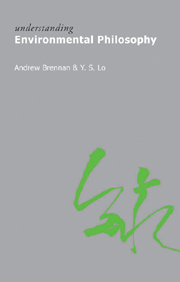Book contents
- Frontmatter
- Contents
- Acknowledgements
- 1 Introduction: the place of environmental philosophy and its basic concepts
- 2 Future generations: what consideration do we owe them?
- 3 Animals: are they as morally valuable as human beings?
- 4 Living things: ethics for the non-human world
- 5 Community: how big is our moral world?
- 6 Natural things: the puzzle of what “natural” means, and whether humans belong to nature
- 7 Foundations: can there be a secular basis for the ideas of human dignity and intrinsic value in nature?
- 8 Origins: political, religious and cultural diagnoses of environmental problems
- 9 Beyond individual responsibility: governance and the affluenzic society
- Questions for discussion and revision
- Further reading
- Bibliography
- Index
Questions for discussion and revision
- Frontmatter
- Contents
- Acknowledgements
- 1 Introduction: the place of environmental philosophy and its basic concepts
- 2 Future generations: what consideration do we owe them?
- 3 Animals: are they as morally valuable as human beings?
- 4 Living things: ethics for the non-human world
- 5 Community: how big is our moral world?
- 6 Natural things: the puzzle of what “natural” means, and whether humans belong to nature
- 7 Foundations: can there be a secular basis for the ideas of human dignity and intrinsic value in nature?
- 8 Origins: political, religious and cultural diagnoses of environmental problems
- 9 Beyond individual responsibility: governance and the affluenzic society
- Questions for discussion and revision
- Further reading
- Bibliography
- Index
Summary
Introduction: the place of environmental philosophy and its basic concepts
Is a whale no more intrinsically valuable than a pig, a fox or a kangaroo?
It is considered humane in some situations to kill an animal to put it out of its misery. Reflect on why there is much more controversy about the mercy killing of human beings.
It is said by some writers that people have no right to pollute the planet, but that equally people have the right to a decent life and to the means of subsistence. Is there any conflict between these two claims?
Do you think the notion of dignity can be applied to animals or plants? If so, explain what it means in your imagined context. If not, explain why only humans can have dignity.
Future generations: what consideration do we owe them?
Vegetarians, vegans, cyclists and in general people who restrain their energy and material consumptions often claim that their lifestyles are better for the environment than those of meateaters, carusers and average consumers. Do you think people without children are likewise justified in claiming that their lifestyles, as people without children, are better for the environment than those of people with children? Do you think sacrificing your opportunity to have children is a virtuous way to do good to the environment? Why or why not?
[…]
- Type
- Chapter
- Information
- Understanding Environmental Philosophy , pp. 208 - 212Publisher: Acumen PublishingPrint publication year: 2010



